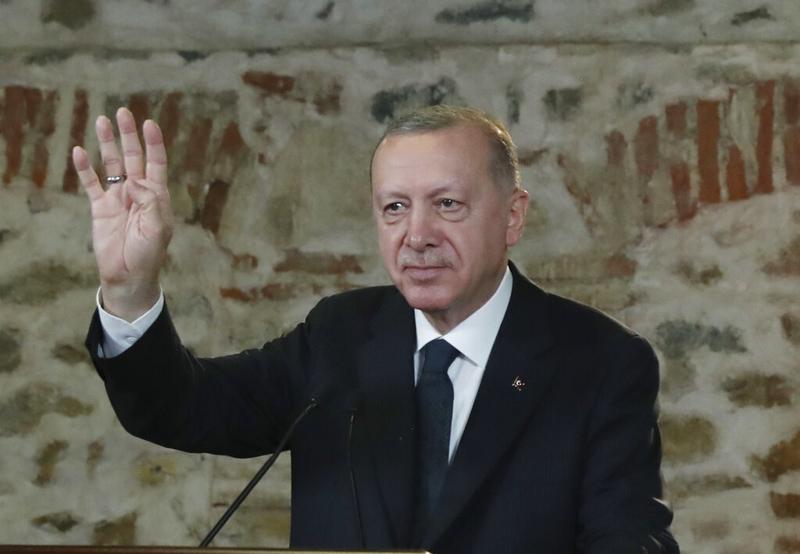 Turkish President Recep Tayyip Erdogan addresses his ruling party members via video link from Ankara, Turkey, Feb 5, 2021. (PHOTO / TURKISH PRESIDENCY VIA AP)
Turkish President Recep Tayyip Erdogan addresses his ruling party members via video link from Ankara, Turkey, Feb 5, 2021. (PHOTO / TURKISH PRESIDENCY VIA AP)
Having accrued broad executive power through a 2017 rewrite of Turkey’s constitution, President Recep Tayyip Erdogan is promising to have another swing at the country’s basic laws.
Just like four years ago, the pledge has kicked off a political storm - but this time, opposition politicians say, that’s exactly what Erdogan intended.
President Recep Tayyip Erdogan is vowing to take aim at the remains of a charter first adopted by a military junta in 1982, a move that might appear to strengthen democracy
The president’s vowing to take aim at the remains of a charter first adopted by a military junta in 1982, a move that might appear to strengthen democracy. Turkey’s opposition parties instead see an attempt to divert attention from a stumbling economy mismanaged by an authoritarian Erdogan and his increasingly unpopular party.
“This is about preventing our citizens from seeing the real problems,” in Turkey, said Ali Babacan, a former economy minister under Erdogan and now chairman of the opposition DEVA Party. “We should never fall victim to efforts to deflect the public’s agenda.”
No majority
The motives alleged by Babacan and other party leaders tally with parliamentary arithmetic: Erdogan’s coalition of Islamist-rooted conservatives and Turkish nationalists is 23 seats short of the majority needed to refer major legal changes to a plebiscite.
ALSO READ: Turkey imposes advertising ban on Twitter, Periscope, Pinterest
What’s more, officials acknowledge the reform proposal hasn’t progressed much beyond presidential musings; and there’s no expectation Erdogan plans to hand back powers to the national assembly, a demand made by leading rivals.
Any overhaul would cement the role of the new political system in remaking Turkey in Erdogan’s vision, according to a person with direct knowledge of constitutional plans who asked not to be identified.
“Dictators do not want a democratic constitution based on human rights,” main opposition leader Kemal Kilicdaroglu, head of the Republican People’s Party or CHP, said in an interview with the Yetkin Report news website published Monday.
Popularity hit
When criticizing the current constitution, Erdogan frequently mentions an organization created by the military to keep a close eye on the country’s universities. Yet his oversight has gone even further - presidential powers to pick loyal university chiefs were expanded, and in recent weeks scores of students in Istanbul who protested just such an appointment have been arrested.
Erdogan’s popularity has suffered as the economy and currency were weakened by tussles with the US and Europe, and in the last 12 months by pandemic restrictions
Erdogan’s popularity has suffered as the economy and currency were weakened by tussles with the US and Europe, and in the last 12 months by pandemic restrictions. Unemployment and prices have risen, while the president’s AK Party lost local elections in both the business hub of Istanbul and Ankara, the capital.
READ MORE: Erdogan's son-in-law quits as finance minister after lira slide
Turkey’s US$750 billion economy has rebounded from the COVID-19 slump faster than most of its peers, but the recovery came at a cost.
Reserves binge
Erdogan’s son-in-law Berat Albayrak, who resigned as economy czar in November, is estimated by Wall Street banks to have spent more than US$100 billion of Turkey’s foreign reserves supporting the currency while he engineered a credit explosion.
Mortgages and consumer loans at negative real rates kept the economy humming but also maintained inflation in double digits, widened the deficit in Turkey’s current-account and eventually derailed the lira.
Erdogan’s son-in-law Berat Albayrak, who resigned as economy czar in November, is estimated to have spent more than US$100 billion of Turkey’s foreign reserves supporting the currency while he engineered a credit explosion
After replacing Albayrak and the central bank governor, Erdogan said the nation had to swallow “bitter-pill policies” of higher interest rates. Stabilizing the economy will require a slowdown in credit, which will eventually mean a slower pace of job creation.
READ MORE: Erdogan sees Turkey's future with EU despite sanction threat
The challenging economic outlook gives the president reason to shift the focus.
For much of the past week, Erdogan has attacked the students protesting in Istanbul, claiming the trouble was stirred up by a LGBT community that has no place in Turkish culture.
The governing party portrayed the rallies as an example of Turkish elites bent on undermining Erdogan. Its opponents see things differently.
“They have thrown a ball of yarn in front of the people,” opposition IYI Party leader Meral Aksener said on Thursday, using a Turkish saying for an attempt to distract attention.
“This is about suppressing the voice of mothers who can’t feed their babies, industrialists who can’t produce, and shopkeepers who lost their businesses,” she said.


